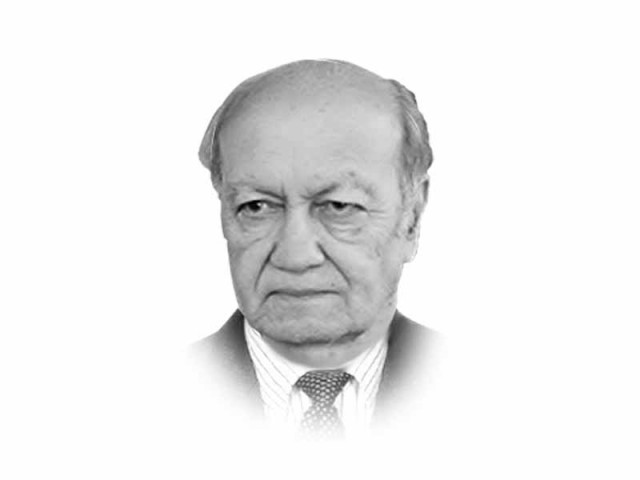How should I vote?
There are still those dark forces that do not believe in democracy

The writer is a retired lieutenant general of the Pakistan Army and a former federal secretary. He has also served as chairman of the Pakistan Ordnance Factories Board
With four martial laws and half the time the country being under military rule the very thought that we are only a few weeks away from a third election without an interruption is truly elevating. But let us not be carried away by this achievement, as the road to consolidating our democracy and making it more representative still remains a major challenge. More so, we have a history of systematic suppression of certain political parties. The recent example was the manoeuvring in the Balochistan Assembly and blatant violation of ethical norms in the Senate elections.
With national elections that close the question on minds of many eligible voters would be which party or candidate should we cast our precious vote? Should it be based on past performance and future expectations? Are party manifestos, individual preferences or group and biradari considerations to be accorded priority? Or some find it advisable to stay away from elections as none of the candidates meet even their minimum expectations. There is also a prevailing impression based on past experience that party manifestos hardly matter as political leaders have never taken them seriously apart from fulfilling a routine requirement?
In the present circumstances where parties are personality based and programmes are given little consideration the best option while voting should be to give greater weightage to the political party that has relatively a better past record and possesses the potential to perform in the future?
Past history bears witness that neither the military rulers nor civilian governments were able to undertake financial and economic reforms. As a consequence, the country has remained perpetually under pressure and dependent on foreign assistance. Economic scholars have repeatedly emphasised the strong link between governance capacity, institutions and economic growth. While voting the political party that is better placed to undertake reforms should be given preference, otherwise the country would continue to remain in debt and be dependent on foreign lending agencies.
Most of the economic problems that Pakistan faces stem from the way political power is monopolised by our elite. They adopt policies to perpetuate their political and economic hold rather than create a society where political and economic rights are more broadly distributed. Corruption also is responsible for corroding government functioning and undermines confidence in their leaders and weakens democracy as a whole. Hopefully, the next government would take effective and discernable measures to combat corruption.
The impending elections have special significance, as it would be the third peaceful transition of power and hopefully contribute in consolidating the democratic process.
Roots of political discontent in Pakistan are essentially poverty, injustice, corruption and warped democratic practices. If political parties were to address these issues seriously at the provincial and federal level and bring about discernable changes it would have a transformational effect.
Continuation of the democratic process should also contribute towards correcting the civil-military imbalance. Pakistan has suffered critically due to this divide and cannot afford to continue bearing this cost. The question is not whether the military or civilian leadership is to be blamed. If our institutional leaders are sincere about constitutionalism and the rule of law then all institutions should work within their constitutional boundaries and avoid stepping into each other’s territory. If weakness of one institution becomes the rationale for intervention then it would be impossible for Pakistan to ever be a normal state. To reinforce this point, are the civilian governments in many countries, including India, Sri Lanka and even several European countries, not suffering from serious governance problems? The people decide either to reject or accept them in the elections and there is no interference by other institutions. These are fundamental questions that our leaders need to seriously address. It is also difficult to subscribe to the argument that Pakistan is different and needs a separate dispensation. These are self-serving arguments that we have been hearing for a long time to distort the democratic structure and find space for controlling policy and influence. Similar arguments still resonate in certain quarters but need to be countered effectively by the civil society and media.
Although in Pakistan foreign policy has never been a matter of serious discourse during elections, it clearly has a huge bearing on the lives of the people. The type of relations that Pakistan has with its neighbours and major powers is a critical determinant in distribution of resources to the military and security agencies. If these are mostly antagonistic as is the case with India and also largely with Afghanistan the role of the armed forces acquires great importance. Moreover, the internal security situation has also demanded major involvement of the military.
Strong strategic, political and economic relations with China are the foundation of our foreign policy. In recent years Pakistan has improved its relations with Russia and is developing closer ties with Central Asian states.
If relations with India were to improve and Afghanistan and Pakistan develop greater trust and understanding for mutual good it would have a beneficial impact on the security situation with its positive spin-off on the economy and political environment. In addition, if the US has a more functional and cooperative attitude toward Pakistan it will benefit both the countries and contribute in stabilising the region. Political leadership that has a better grasp of foreign policy and are capable of using it for expanding Pakistan’s economic and strategic interests in a globalised world should be given preference.
Published in The Express Tribune, June 20th, 2018.
Like Opinion & Editorial on Facebook, follow @ETOpEd on Twitter to receive all updates on all our daily pieces.















COMMENTS
Comments are moderated and generally will be posted if they are on-topic and not abusive.
For more information, please see our Comments FAQ